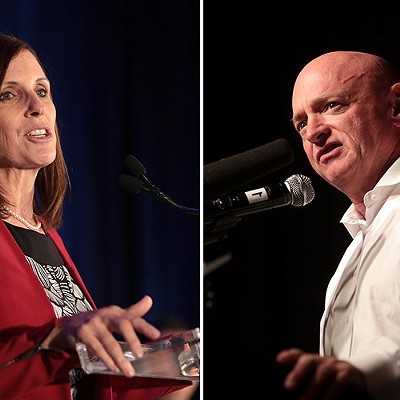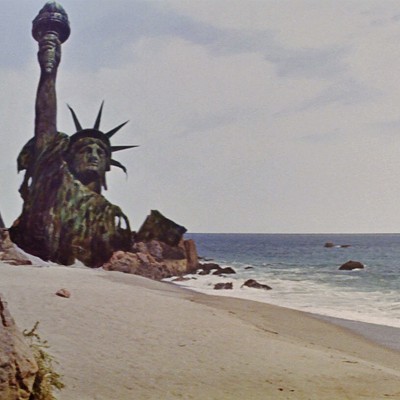This lesson is hardly lost on Arizona's GOP congressional contingent. In 2005, they compiled a dismal record on everything from vehicle fuel efficiency and renewable energy to protecting endangered species and the Arctic National Wildlife Refuge--all while raking up scads of industry contributions.
The League of Conservation Voters and Defenders of Wildlife rated these voting records, recently released as annual scorecards. They reveal that most of Arizona's Republicans voted pro-environment from 0 to 13 percent of the time. Meanwhile, the two Democrats--Reps. Raúl Grijalva and Ed Pastor--boasted nearly perfect environmental scores.
Still, the real story isn't how our politicians voted, but why. "We compile these scorecards so the public can hold Arizona's politicians accountable," says Scotty Johnson of Defenders' Southwest office. "They all promise todo the right thing, but their voting records show who wears the white hats--and who sells out our environment to special interests. "
Scraping the barrel's bottom was Sen. Jon Kyl, who scored 13 percent from the Defenders of Wildlife, and a mere 5 percent from the League. In the past year, Kyl has backed a slew of Jack Abramoff-type maneuvers to sneak Arctic drilling onto unrelated bills. Meanwhile, he opposed requiring electric companies to hike renewable energy production, a Senate resolution recognizing the reality of global warming, and forcing coal-burning power plants to reduce their mercury emissions.
"Senator Kyl ended up voting 'no' on just about everything we were scoring with regards to energy policy," says Susan Culp, executive director of the League's Arizona affiliate. But Kyl did vote for the 2005 Energy Policy Act, which Culp calls "one of the most anti-environmental laws to come out of Congress in memory."
She rattles off a list of things the law doesn't do, from lowering our reliance on foreign oil to raising fuel efficiency standards. But it does dish out whopping subsidies to already fat energy companies.
Ryan Patmintra is Kyl's press secretary. In an e-mail to the Tucson Weekly, he takes a slightly different perspective. "A fair review of Senator Kyl's record shows a consistent commitment to the preservation of Arizona's environment, " Patmintra writes, "and this scorecard is hardly a credible, non-partisan measure of this support."
But a clearer explanation of Kyl's score likely comes from another source--namely his $6.2 million campaign war chest. Details of that fund are compiled by the Center For Responsive Politics. You can find them at www.opensecrets.org.
Since 2001, Kyl has received $62,000 from electric utilities. That could account for his mercury emissions vote. And over his career, Kyl has accepted more than $214,000 from the oil and gas companies. This year he's ranked eighth among his Senate colleagues in cash scored from that industry. Contributors include Exxon Mobil, which has given him nearly $28,000. As it happens, the oil giant has been at the forefront of lobbying efforts to open ANWR to drilling.
Kyl also ranked third among senators for contributions from the auto industry, which steadfastly opposes higher fuel efficiency standards.
Sen. Kyl's record can be considered a disappointment, if hardly a surprise. Not so for John McCain, however. The self-styled "maverick" and potential presidential contender has steered himself to the right in recent years, and it shows: He scored only a 45 percent from the League this year, down from 67 percent in 2004. Still, "McCain did reasonably well, although his score did slip a little bit from last year," says Culp. "On issues like drilling in the Arctic National Wildlife Refuge, he's been a great champion--he voted to remove a drilling provision from the budget."
McCain also may be distancing himself from the oil and gas companies; in 2000, he ranked ninth in the Senate for industry contributions. But in 2006, he doesn't even make the top 20 list.
While the Senate's record is bleak. the Big Kahuna of rotten legislation was hatched in the House of Representatives, with a move to gut the Endangered Species Act. Spearheaded by Rep. Richard Pombo of California, the measure aims to drastically shrink critical habitat protections for at-risk animals. If passed into law, this would represent a massive triumph for the agriculture industry's ranchers and farmers, who fret about accommodating any endangered animals on their property. Land developers also stand to win if endangered species protections are reduced.
However, that move conflicts with national sentiments, says Scotty Johnson. "Polls show that 86 percent of the public see the Endangered Species Act as an important safety net."
So why the vote? While Pombo's intense ties to California's Central Valley agricultural industry are well-known, tracing campaign contributions to our own representatives tells much the same story. Democrats Pastor and Grijalva opposed it, but Arizona's entire Republican delegation supported the measure. And that includes outgoing Rep. Jim Kolbe, who received a mere 6 percent rating from the League, and 0 percent from Defenders.
Coincidentally, for his 2004 election Kolbe did receive $25,555 from agribusiness, and another $56,000 from the real estate industry. He also accepted $56,000 from the energy industry, which might help explain his steady support for drilling in the ANWR.
By contrast, Grijalva ranks number 12 in the House for contributions--from environmental groups, that is. In fact, the League of Conservation Voters counts among his biggest donors, giving $7,004 in the 2004 election cycle.
And in particular, he's dismayed at the Arizona delegation's eagerness to abandon the Endangered Species Act--for whatever reason. "Of all the issues we've encountered, the assault on the ESA is a very sad chapter," he says. "Species extinction is not something you can politically justify."
But maybe money can justify it, at least to some. Either way, Susan Culp hopes environmental justice arrives with November's elections. "Many of our delegates are out of step with the public when it comes to preserving our natural heritage and protecting public health," she says. "They're voting as if they are only beholden to anti-environment special interests in Washington, D.C. That's what these scorecards tell me."












